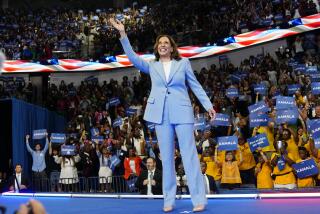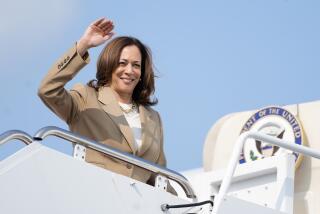Gore’s Too-Short List
- Share via
It doesn’t take more than a few seconds to eyeball the photographs of Democratic nominee-to-be Al Gore’s so-called “short list” of likely running mates to recognize something strikingly similar about these faces.
They are pretty pale.
Excuse me, but don’t the movers and shakers of the Democratic Party know any non-Caucasians? Is there not a single distinguished individual with a complexion darker than Dick Gephardt’s who could be deemed worthy of a little public speculation? Was there no way for that short list to be slightly longer?
We honestly couldn’t expect the Republicans--even in their newer, kinder, gentler mutation--to come up with anything revolutionary quite yet, particularly with Colin Powell still content to be a four-star toastmaster general. And to come up with eligible White House running mates (or top-of-the-ticket candidates), you could inspect the rolls of Congress with a magnifying glass searching for Republican legislators of color and have little luck beyond J.C. Watts, who is 42 and a guy to keep an eye on in 2004 or ought-8.
Yet here we are, living in the Roaring Twenty Hundreds, and who do the progressive, bridge-to-the-future Democrats have to offer us as Gore’s potential second-in-command? A couple of young senators, Evan Bayh, a 44-year-old preppie from beautiful downtown Shirkieville, Ind., and the Southern lawyer-turned-pol John Edwards, 47 . . . a couple of more mature senators, John Kerry and Joseph Lieberman, to help New Englanders cotton to Gore’s cause . . . Gephardt, a dozen-term House man who might tip the Missouri vote in Gore’s favor.
And, with at least a passing nod to America’s majority gender, the “short list” is said to have added the name of Gov. Jeanne Shaheen, 53, of New Hampshire, who is a possible alternative in case the party’s leaders find the gumption to try to get Gore elected with a bold Mondale-ian strategy.
*
For those of us who attended the 1984 Democratic National Convention in San Francisco, the anointing of Geraldine Ferraro as the candidate’s running mate was more than a moment in space and time. It was a sign the future had finally arrived. A little shy of 115 years had passed at that point since a women’s suffrage law had passed in the Wyoming territory and the West had begun to treat women as equals. Now, here was Walter Mondale, running with one.
We with testosterone who considered ourselves ardent feminists applauded this choice and saw it as a portent of things to come. Men and women alike were even able to laugh off the more sexist, sophomoric reactions to Ferraro’s emergence, the “Fritz and ----” buttons and bumper stickers, goofing on Mondale’s nickname, or the risque editorial cartoons and Johnny Carson jokes. The bottom line was that Ferraro was in the game. And besides, wanna-be veeps from William E. Miller to Spiro Agnew had gotten their fair share of skewering too.
But the campaign?
Well, that went poorly, Mondale-Ferraro ultimately being flattened as if hit by a steamroller in a Looney Tunes cartoon. A grand total of 13 electoral votes was all the Democrats got--worse than George McGovern, Al Smith and other big Dem losers.
We knew it would be awhile before a candidate would “risk” a shot at the White House on someone neither of his sex nor his race. By the wayside fell the Patricia Schroeders and Jesse Jacksons who briefly captured imaginations, just as Julian Bond had for some of us in the ‘70s. Where was our next woman, African American, Asian or Latino with what we euphemistically called clout?
*
Back in 1966, we got our first black U.S. senator (Edward Brooke) in the nearly 100 years since Hiram Revels won a term in Mississippi. A year later, we got our first black Supreme Court justice (Thurgood Marshall) and our first black big-city mayors, in Cleveland (Carl Stokes) and in Gary, Ind. (Richard Hatcher). A year after that, Shirley Chisholm took her place as the first black woman elected to Congress.
William Dawson became the first black chairman of a major House committee. Daniel James Jr. became our first black four-star general. Mickey Leland chaired the Black Congressional Caucus. In 1989, courtesy of Virginia, we finally got our first black governor, Douglas Wilder. The world was evolving before our eyes.
“We have come to our nation’s capital to cash a check,” Dr. Martin Luther King Jr. once said. “When the architects of our Republic wrote the magnificent words of the Constitution and the Declaration of Independence, they were signing a promissory note to which every American was to fall heir. Instead of honoring this sacred obligation, America has given the Negro people a bad check, a check which has come back marked: ‘Insufficient funds.’ ”
It remains true. There are 35 million black or African American citizens in this country, or 13% of the population, and 31 million more of Latino origin. What do we have to offer them in 2000? Not even a place, or a face, on the short list.
*
Mike Downey’s column appears Sundays, Wednesdays and Fridays. Write to: Los Angeles Times, 202 W. 1st St., Los Angeles, CA 90012. E-mail: mike.downey@latimes.com.
More to Read
Get the L.A. Times Politics newsletter
Deeply reported insights into legislation, politics and policy from Sacramento, Washington and beyond. In your inbox twice per week.
You may occasionally receive promotional content from the Los Angeles Times.










